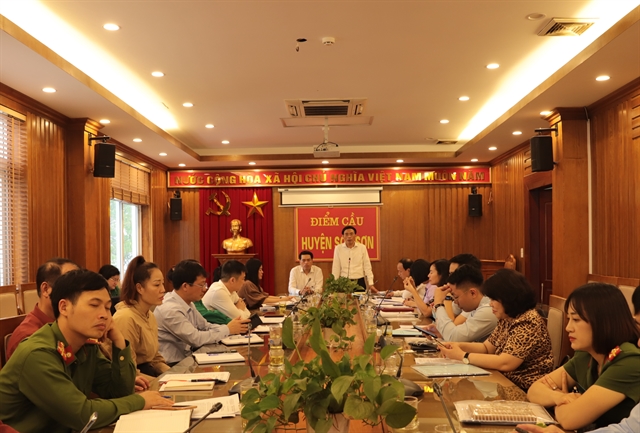 Society
Society


|
| Nguyễn Ngọc Sơn, Deputy Director of Hà Nội Department of Agriculture and Rural Development, meets with Sóc Sơn District's authorities about inspection of food safety in the area. Photo courtesy of the Hà Nội's Department of Agriculture and Rural Development |
HÀ NỘI — In the first three months of 2023, Hà Nội has increased inspections of fresh food products, to ensure the quality of food for people.
The aim is to detect any violations and take appropriate action in accordance with the law, to provide clean and safe food to consumers, including foreigners residing and working in Hà Nội.
In order to strengthen the quality management of agricultural, forestry, and fishery products in the market, Nguyễn Thị Thu Hằng, Head of the Hà Nội Agro-Forestry and Fisheries Quality Management Sub-Department, stated that the city’s Department of Agriculture and Rural Development has increased sampling and monitoring activities in the first quarter of 2023, focusing on fresh products that are consumed daily by people at high-risk stages, such as vegetables, meat, livestock, poultry, and seafood.
Accordingly, the department has taken 29 samples of vegetables, meat, and aquatic products, and has obtained results for five out of 29 samples, with all being safe for consumption. The department has also inspected 93 businesses and individuals involved in producing and trading agricultural and fishery products. Two individuals and two corporations have been penalised for failing to meet food safety standards.
The department has also cooperated with localities within Hà Nội to carry out inspections in local areas. In Thanh Trì District, inspections have been conducted on 4,757 production facilities and one pig slaughterhouse. The People’s Committee of Thanh Trì District has found 11 cases of food safety violations, which mainly involved trading smuggled food or food of unknown origin.
Hồ Việt Hùng, Vice Chairman of the Sóc Sơn District's People’s Committee, said the district has increasingly held inspections as well as applied new models to control food safety. However, they still face potential risks with pesticide overuse and small scale of production in the area.
Nguyễn Trọng Khiển, Vice Chairman of the Thanh Oai District's People’s Committee, also saw small-scale food production as a problem to manage food safety in the area. Food is mainly distributed to local markets. There are not many cold storage facilities to distribute food on a large scale, therefore, it often comes directly from suppliers to distributors.
Khiển also said there are currently no tests at the district level, for the district to open the specialised inspection of food safety, to measure the amount of chemicals, pesticides, plant protection, mycotoxins and metal content in the food.
Solutions for future management
According to Nguyễn Ngọc Sơn, Deputy Director of Hà Nội Department of Agriculture and Rural Development, agricultural products and food are primarily consumed through traditional channels, such as wholesale markets, wet markets, and distribution businesses, as there are very few transit centres and large warehouses. Lack of cold storage to preserve food means that fresh products are often delivered directly to retail locations by suppliers, resulting in a small volume of goods transported. This can affect the quality of the delivered products.
He said the department will continue to inspect food production across the city, especially across value chains, the first stages of production and wholesale markets.
“To support the inspection and future management, Hà Nội Department of Agriculture and Rural Development suggests the Ministry of Agriculture and Rural Development coordinate with the Ministry of Health in reviewing a list and usage criterion of chemicals, antibiotics, veterinary drugs and plant protection drugs for food products,” Sơn said.
At the district level, Nguyễn Thị Bích Ngọc, Vice Chairman of the Thạch Thất District's People’s Committee, said the district was raising awareness of safe agricultural production. They will strengthen inspection and supervision of food safety, and resolutely handle violators.
Hà Nội Department of Agriculture and Rural Development will also continue focusing on production areas, granting codes for growing and farming areas, as well as linking the value chain to supply safe and quality food.
They will also support businesses and cooperatives to develop trademarks for agricultural, forestry and fishery products. VNS




